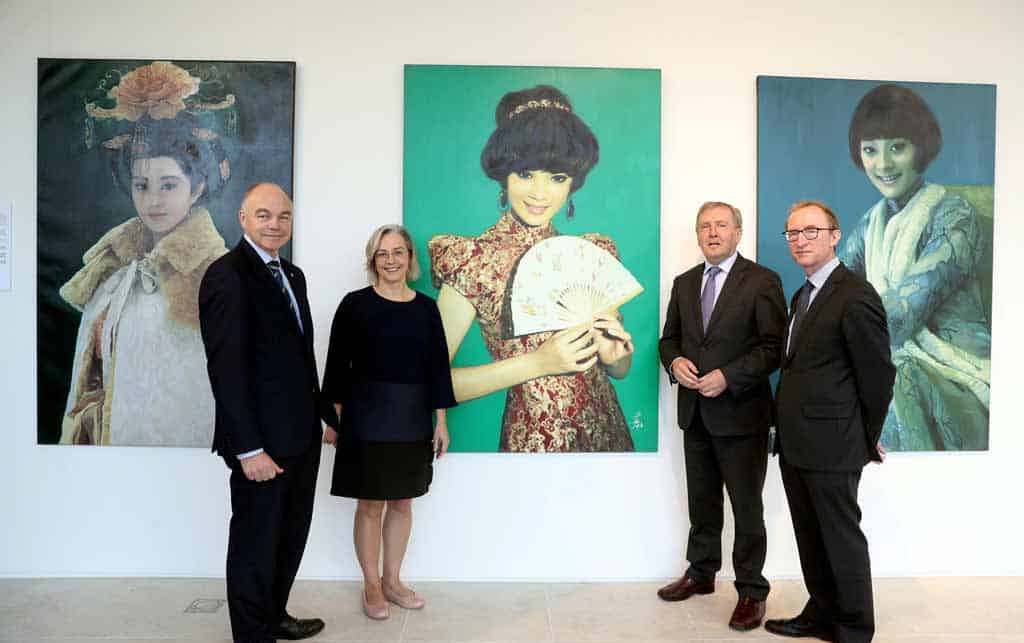President of UCD, Professor Andrew J Deeks, Professor Imelda Maher, UCD Dean of Law, Michael Creed TD, Minister for Agriculture Food and the Marine and Tim Scanlon, Partnership Chairman, Matheson
Law firm Matheson and UCD Sutherland School of Law hosted an agri-food and beverage conference: ‘Cultivating New Opportunities: The Agri-Food and Beverage Perspective on Brexit and China.’
Delivering a keynote address during the conference at the UCD Confucius Institute, Minister Michael Creed TD said:
“Brexit is a reality that will touch every industry across Ireland, but it is of particular significance for the agri-food sector given the importance of the UK market to Irish agri-food exports and demand for Irish produce globally.
We boast some of the best agri-food products and brands in the world, and we export those products to 180 countries. Brexit, of course, presents a unique challenge in that context, but it also reminds us of the need to continually strive to develop new markets and to grow existing ones. In recent years much of our attention in terms of market diversification has been on Asia – where we have seen the value of exports nearly quadruple since 2009 – and particularly on China. Indeed, an intensified focus on market diversification is a central component of the suite of measures deployed by myself and my Government colleagues in response to Brexit so it is important that we are continually striving to meet challenges such as Brexit, and maximise the opportunity offered by markets such as China. We have introduced a series of contingency measures to safeguard producers from any negative impacts of Brexit, and enable them to continue to capitalise on international opportunities, and I therefore look forward to seeing the results of this conference, which I believe will help to inform future policy conversations.
While acknowledging the challenges of Brexit to the agri-food and beverage sector, participants at the conference also discussed how Brexit is accelerating the sector’s exploration of priority growth markets. South-east Asia and China in particular were highlighted as key target markets presenting significant opportunities for Ireland.
Ireland’s agri-food exports to Asia increasing
The agri-food and beverage sector employs over 250,000 people directly and indirectly, and is central to Ireland’s export-led growth strategy. Ireland is currently the UK’s largest provider of beef and dairy products, while Ireland imports approximately €4 billion of agri-food products a year from the UK. Measures to help the sector withstand the impact of Brexit have been put in place, one of which is diversification into international markets. Asian markets, particularly China, present significant opportunities for these sectors. In 2017 alone, exports to Asia grew six percent to €850 million.
Tim Scanlon, Partnership Chairman, Matheson commented:
“Today’s conference has reflected the unique set of challenges which Brexit presents for the Irish agri-food and beverage sector – but it has also shown the commitment, drive and determination of the sector to meet those challenges full on and to harness any potential opportunities that may arise. That may be through upskilling, investment in new facilities or the pursuit of new opportunities in potential growth markets in South-east Asia and China in particular. The quality of our Irish products is opening doors in these markets – and while there are challenges to navigate, such as cultural and regulatory differences, they can be overcome. In recent months Matheson has seen a significant upsurge in requests from companies seeking advice as to how best to deal with these issues.”
Factors such as route to market, competition, supply chain and the Irish market were discussed by panellists within the context of Brexit.
Speaking at the conference, Professor Imelda Maher, UCD Dean of Law remarked:
“Whatever the final agreement between the UK and the EU after Brexit, it marks a major legal, political and economic challenge for Ireland. The disruption also points the way to opportunities, with UCD research shedding light on those new avenues across law, society, economy and culture. We are pleased to host this forum with Matheson, a close collaborator and valued supporter of UCD Sutherland School of Law.”






